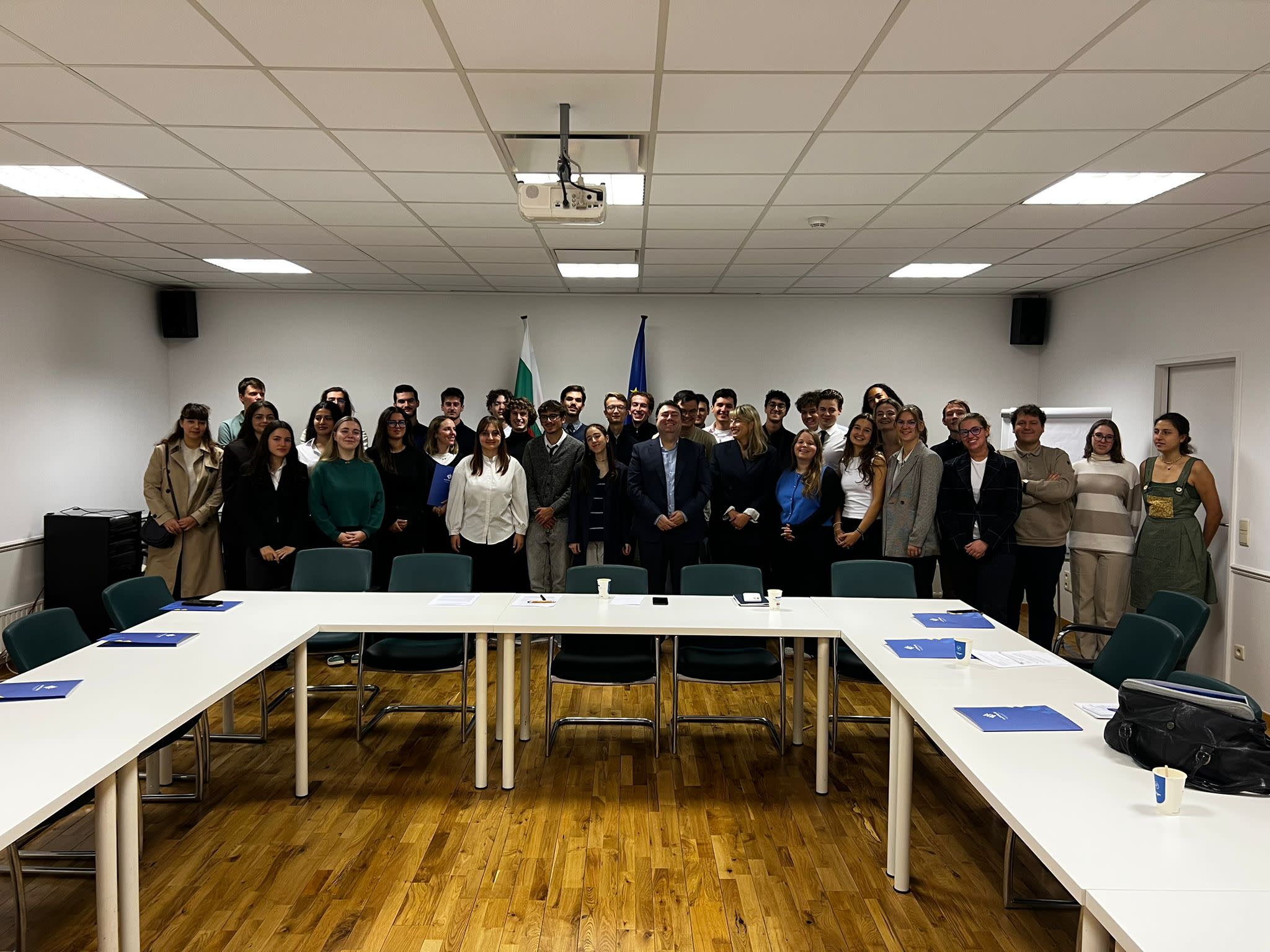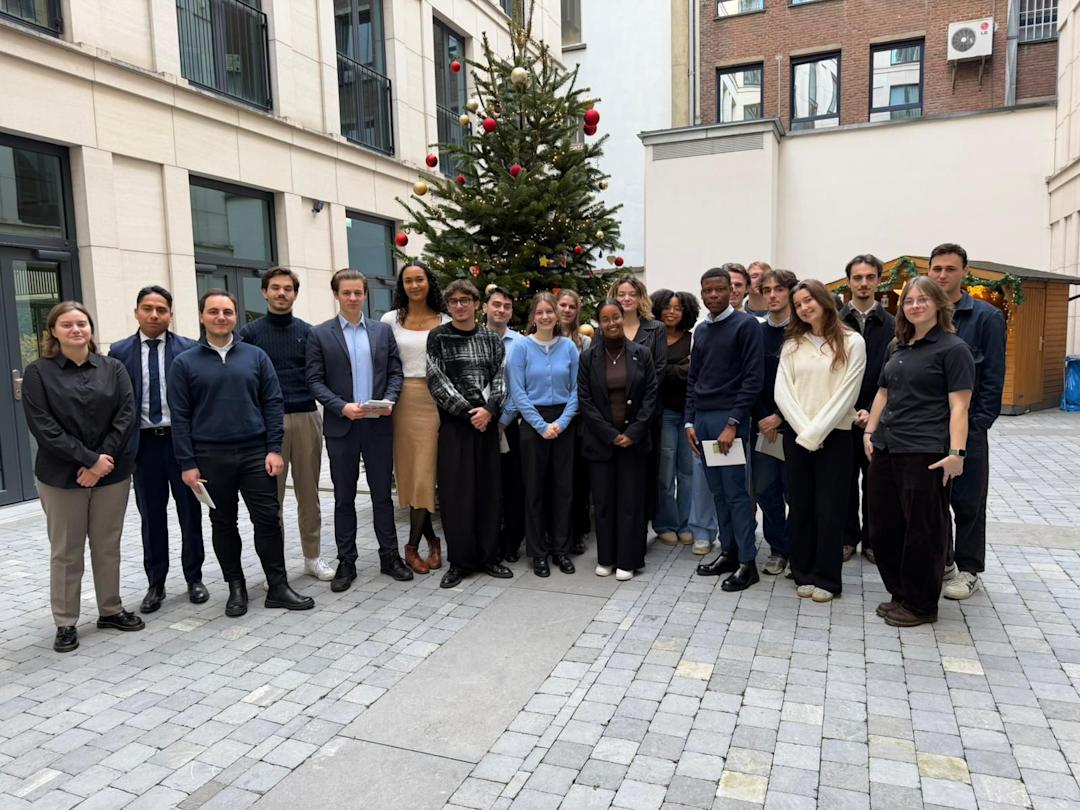A Morning at the Permanent Representation of Bulgaria to the European Union

To start the year off on a good note , the Comité Diplomatique is organising visits to three Permanent Representations to the European Union : those of Bulgaria, Slovenia and Cyprus , in order to discuss EU-related topics with each country’s diplomats and to compare their perspectives.
During our first visit to the Permanent Representation of Bulgaria on Thursday 9 October, we had the honour of meeting the Permanent Representative H.E. Rumen Alexandrov . The Bulgarian mission is the country’s largest diplomatic delegation in Europe. Despite a very busy schedule, Mr Alexandrov and Ms. Natalia Uzunova , his attachée responsible for COREPER II kindly took the time to explain their work, priorities and positions on a wide range of current issues. They emphasised how the war in Ukraine has dramatically affected their calendar and working methods: meetings are now held every Sunday and and their agenda has been compressed and intensified.
Mr Alexandrov described how the Permanent Representation functions and explained their role in COREPER II ,the Committee of Permanent Representatives formation II , that brings together each member state’s head of mission in Brussels and prepares the most political and high-level dossiers for the Council ; notably on economic and financial affairs, foreign affairs, general affairs and justice and home affairs. It irons out technical and political compromises so that fewer issues reach the ministerial level unresolved. This is why , COREPER II is central to how member states coordinate positions on defence, security and foreign policy within the EU.
Unsurprisingly, defence and security now dominate the Bulgarian agenda in COREPER II. The delegation highlighted the EU’s work on sanctions and on defence spending and argued that the Union should coordinate resources and financing while helping to strengthen a European defence-industrial base. In the current context of increased drone activity and other hybrid threats, Mr Alexandrov insisted the EU must act quickly because the geopolitical situation is evolving fast; he consequently argued for prioritising active EU measures on drones.
He also addressed practical constraints. In several countries across the Balkans and Eastern Europe some telecommunications and certain drone-related systems have been procured from Chinese suppliers . Replacing these specific systems with European-made alternatives can be very costly and time-consuming, which complicates efforts to “Europeanise” procurement rapidly; this is a regional trend rather than a universal fact for every system or country. Bulgaria therefore calls for realistic procurement and legislative solutions at EU level and for more targeted financial support under the Neighbourhood Policy to help stabilisation and enlargement efforts .
Mr Alexandrov , who has been in post for four years and was involved in the process himself , was particularly proud to talk about Bulgaria’s recent integration milestones: adoption of the euro and full accession to the Schengen Area. Bulgaria’s accession to the eurozone has been confirmed for 1 January 2026; the Council of the European Union set the conversion rate at 1.95583 lev per euro as part of the final decisions. This step crowns a long process of economic alignment that began when Bulgaria joined the EU in 2007 and has included ERM II membership and repeated convergence assessments.
He especially mentionned that Bulgarian business, political parties and a growing share of public opinion now support these decisions; though initially public opinion was cautious, more than half of the population now appear convinced of the benefits. He also recalled to us the long transition since the fall of the Soviet Union and described Bulgaria’s currency board regime and gradual alignment with EU standards as a patient, often difficult process.
On Schengen, Bulgaria’s accession has also been incremental: air and maritime checks were lifted earlier, and the decision to lift internal land-border controls came into effect on 1 January 2025 , making Bulgaria a full Schengen member for person-check purposes. This removal of internal land-border checks marks a significant step for free movement and regional integration.
We finally discussed demographic and labour issues. Demography is a strategic challenge for Bulgaria: the government is trying to highlight the country’s demographic strengths at the EU level, including a positive migration rate within the region that it sees as an advantage. However , housing market weaknesses and social infrastructure gaps remain concerns .
To conclude, this first visit was extremely informative. We covered a wide range of topics and it was particularly instructive to see Bulgaria’s positions in a fragile geopolitical context. Mr Alexandrov was frank about the EU’s near-term challenges and realistic about the difficulties ahead, while also highlighting the concrete benefits Bulgaria has gained from EU membership .

